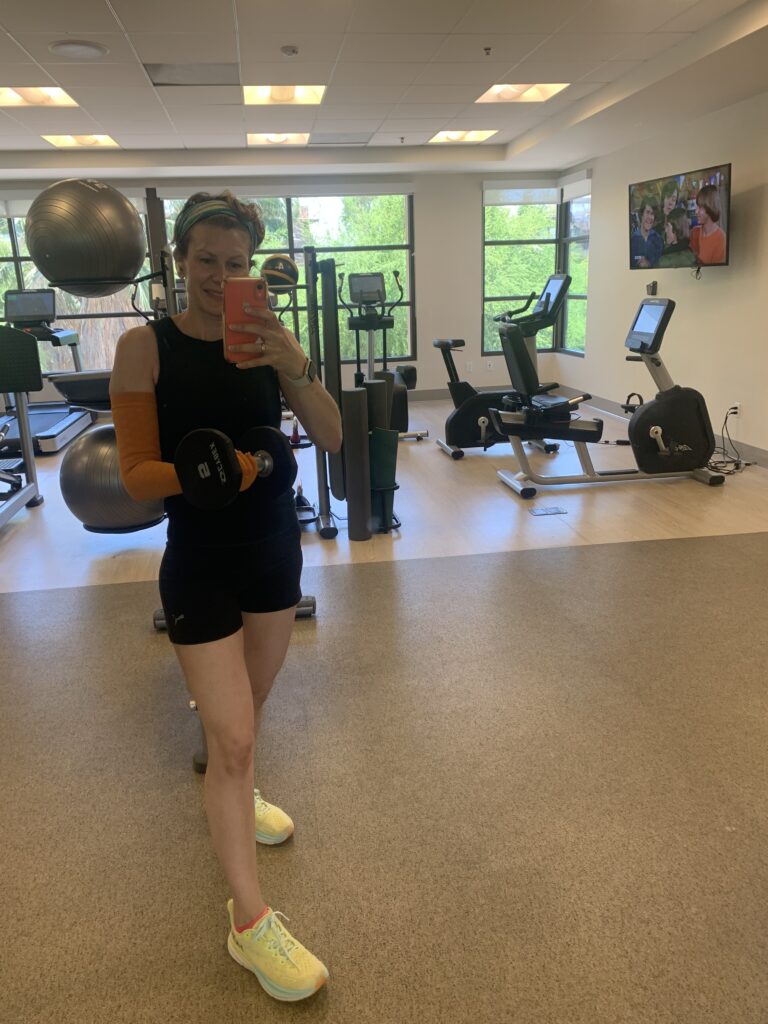How to cope with Hormone Therapy
& Stick to it
If your cancer was Hormone receptor positive, you will be on Hormone Therapy to prevent future recurrence, which for young women means instant prolonged menopause. The joys come with night sweats, hot flashes and weight gain. Gynecological issues include dryness, pain, and less desire for intimacy. You couldn’t wait for your active treatment to be over, but now you are struggling with new challenges that don’t affect only you but also your partner!
You are not alone
For those of us with estrogen-driven cancers, hormone replacement therapy isn’t an option for alleviating menopausal symptoms. While the list of possible hormone therapy side effects is long, the most common ones include:
- Hot flashes and night sweats
- Weight gain
- Emotional challenges and mood swings
- Vaginal dryness
- Decreased desire for intimacy
- Bone loss
- Joint pain
Every person’s experience is unique, but it’s crucial to find strategies that work for you and maintain open communication with your doctor. Remember, there are options to try different drugs to find the one that suits you best.
Unfortunately, there is not a magic bullet and coping with the side effects of Hormone Therapy entails Lifestyle changes. They are hard and require work but they can be effective. Don’t give up, there is lots of help out there! I will also list at the end where you can find resources that help you implement lifestyle changes to cope with Hormone Therapy side effects.

Coping with Hot Flashes and Night Sweats
Hot flashes and night sweats are a common side effect of hormone therapy. You may experience intense heatwaves rolling over your body, leaving you covered in sweat. The more stressed you are, the more frequently and intensely they may occur. Suddenly, it’s not your child waking you up at night, but you may experience what feels like an inner volcano erupting in your body several times a night, leaving you with wet pajamas and sheets. I’ve been there. My quality of sleep decreased dramatically as night sweats kept waking me up. It took me about a year of trial and error to find out what works for me. Here are some strategies that can help:
- Dress in Layers: Wear layers during the day and keep a small fan nearby.
- Sleep Comfortably: Consider sleeping with minimal clothing or using cooling bedding materials like bamboo sheets, a buckwheat pillow and a mattress protector made of natural fibers.
- Adjust Your Diet: Limit spicy foods and alcohol, which can exacerbate hot flashes.
- Try Natural Remedies: Explore acupuncture, hypnotherapy, and bedtime meditations.
- Consult Your Doctor: Ask about supplements like Relizen and melatonin or prescription drugs such as Gabapentin, Effexor, or the new drug Veozah, which worked best for me.
It may be a trial and error process but don’t give up, and don’t suffer in silence!

Managing Weight Gain
Weight gain during menopause is common due to a slowed metabolism. If you continue to eat like before and keep your activity level the same, your weight will go up. Here’s what you can do to manage it:
- Exercise regularly: Combine cardio and strength training to boost your metabolism. Strength training will help you build lean muscle mass and therefore burn more calories at rest.
- Eat healthily: Focus on proteins, vegetables, fruits, and whole grains. Reduce alcohol intake. Change your diet in a way that is sustainable for the long term.
- Be patient: Understand that change is a process and seek support from a health coach if needed. It is hard work to cook healthy and find the time to work out, especially if you still have young kids that need a lot of care. Bear in mind that staying healthy is a great way to care for your children.
- Read my blog post “6 Lifestyle Changes After Cancer” (coming soon).

Dealing with Emotional Challenges and Mood Swings
Hormone therapy can lead to emotional challenges, including mood swings and irritability. You may feel it is harder to parent your young kids with calm and cool or you may feel depressed. Here’s how to manage these feelings:
- Practice Patience: Healing takes time. Remind yourself and your loved ones of this.
- Connect with Survivors: Find support through communities like Little Pink Houses of Hope. I believe it is important to connect to other survivors that are in a similar age, time out of active treatment, and also have kids to care for. I highly recommend the “Little Pink Houses of Hope“, you will find compassion, friendships, hope and not feel alone on your journey. To learn more about our experience with them click here.
- Incorporate Mindfulness: Use breathing exercises, meditations, and guided imagery.
- Make Time for Yourself: Prioritize self-care, even if it’s just for 10 minutes a day. Put it in your calendar and think 10 minutes is better than nothing. Check out the apps: Insight Timer, Calm or Headspace.
- Exercise: Physical activity can lift your mood.
- Seek Professional Help: A therapist can help you cope with your emotional wellbeing, so that Breast Cancer doesn’t become your life but stays part of your life.

Addressing Vaginal Dryness
Vaginal Dryness can be unexpected and very uncomfortable and affect Intimacy as well. Intimacy can become painful. Here’s how to manage it:
- Use Gentle Products: Avoid soaps with harsh chemicals or scents and use a daily moisturizer. I like Vmagic Organic Vulva Cream
- Try Hyaluronic Acid Inserts: Products like Revaree from Bonafide or Hyalogyn can help with prolonged moisturization.
- Use Lubricants: Find a lubricant that works for you, such as Uberlube.
- Adjust Your Diet: Incorporate fermented foods, healthy fats, and avoid infections by maintaining a balanced vaginal microbiome. Eat healthy fats like flax seeds and avocados to help create a protective, mucosal lining inside the vagina.
- Consult Your OBGyn: Ask about treatments like laser vaginal therapy.
- Visit a Pelvic Floor Physical Therapist: They can offer valuable insights and treatments for vaginal health.

Overcoming Decreased Desire for Intimacy
Body image issues, loss of sensation in your breasts, and a reduced libido, accompanied by vaginal dryness and possible painful sex, can make it difficult to get in the mood. Here’s how to address it:
- Understand the Causes: Identify whether body image issues or physical changes are affecting your desire.
- Communicate with Your Partner: Open discussions can help you explore new ways to connect.
- Seek Professional Help: A pelvic floor physical therapist or a sexual health therapist can provide tailored advice and treatments. You can find a sexual health professional at the American Association of Sexuality Educators, Counselors and Therapists (Aasect.org) .
- Check out additional resources: The App MeetRosy, which is a Doctors’ developed app that empowers, educates, and stimulates women by providing evidence-based practices for improving their sex life.

Preventing Bone Loss
If you’re on ovarian suppression with an aromatase inhibitor, bone loss is a concern. Here’s how to prevent it:
- Exercise: Engage in weight-bearing exercises with impact (anything that adds additional force or jolt through your skeleton), along with muscle-strengthening exercises. Weight-bearing exercises with impact involve anything from walking to jumping. Muscle-strengthening exercises involve moving your muscles against resistance, which can be weights, resistance bands, or your body weight. With either type of exercise, you should choose your intensity and gradually make your exercises more challenging.
- Ensure Adequate Calcium and Vitamin D: Obtain these nutrients through your diet or supplements.
- Monitor Bone Density: Get regular scans and potentially bone-strengthening infusions as recommended by your doctor.

Coping with Joint Pain
Decreased Estrogen affects also your cartilage, which is the connective tissue in joints and bone turnover, so you may experience inflammation and pain. Being on Ovarian Suppression with an Aromatase Inhibitor, your Joint Pains may be more pronounced. Here’s what you can do:
- Exercise Regularly: Physical activity helps reduce joint pain and stiffness.
- Adjust Your Diet: Include anti-inflammatory foods (f.eg.dark leafy greens, avocados, olive oil,nuts, berries and cherries, organic green tea, fatty fish, turmeric and ginger, flax and chia seeds, soy beans) and avoid those that trigger inflammation (ultra processed foods, sugar, refined carbs, red and processed meats).
- Consider Supplements: Tart cherry juice may help, but always consult your doctor before trying new supplements. Some supplements may have drug interactions.


Finding Support and Resources
Lifestyle changes are challenging, but support is available. Organizations like DoCancer can sponsor sessions with a health coach or therapist. Building a support network and connecting with other survivors can also be beneficial. One of the best ways to do this is through the Little Pink Houses of Hope. Read more about my experience here.
Also, don’t forget to build your support network to integrate your new healthy habits. Maybe you can start exercising with a friend or you organize regular get togethers with friends that want to also improve their eating habits.
Remember, cancer is a part of your life, but it doesn’t define you. With the right strategies and support, you can navigate this journey and find relief.
By addressing these common challenges with practical solutions, you can improve your quality of life while on hormone therapy. Don’t hesitate to seek support and explore different options until you find what works best for you.
Join Our Community
If you found this guide helpful, please share it with others who might benefit. For more detailed information, personal stories, and expert advice, subscribe to my newsletter [Subscribe Now].
Follow Me on Instagram
For weekly inspiration, tips, and updates, connect with me here!
Thank you for being a part of our community.

